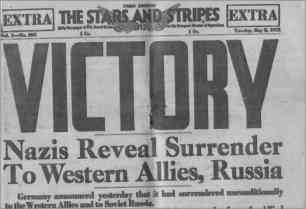People were already on the streets celebrating on 7 May, and huge crowds gathered in London on the following day. At 3.00pm Churchill made a radio broadcast. In Trafalgar Square, an eye-witness noted, '...there was an extraordinary hush over the assembled multitude', as Churchill's voice was relayed over loudspeakers: '... the evil-doers lay prostrate before us ... Advance Britannia.'
The King and Queen appeared eight times on the balcony of Buckingham Palace, while the two princesses - Margaret and Elizabeth (the present Queen) - mingled with the crowds. Churchill gave an impromptu speech on the balcony of the Ministry of Health, telling the crowds, 'This is your victory.' (BBC here)
Winston Churchill May 8, 1945:
God bless you all. This is your victory! It is the victory of the cause of freedom in every land. In all our long history we have never seen a greater day than this. Everyone, man or woman, has done their best. Everyone has tried. Neither the long years, nor the dangers, nor the fierce attacks of the enemy, have in any way weakened the independent resolve of the British nation. God bless you all.
More than a million people celebrated in the streets to mark the end of the European part of the war. Representatives of Nazi Germany signed the surrender documents ending the greatest conflict ever to envelope Europe on May 7 in the French city of Reims. The fighting was to cease at 11:01 AM the next day. Six years of bloodshed were over.
In London, the following day, the streets were filled with people and street parties. Bands played, flags flew and the air was filled with fireworks. Crowds massed in Trafalgar Square and up The Mall to Buckingham Palace, where King George VI and Queen Elizabeth, accompanied by Prime Minister Winston Churchill, appeared on the balcony of the Palace before cheering crowds..

Military personnel and civilians celebrate VE-Day on Sparks Street in Ottawa on May 8, 1945. (CP Photo/ National Archives of Canada, PA-114617)
Victory in Europe
CBC News Online |
The news flash reached Canada at 9:36 p.m. Eastern Daylight Time on May 7, 1945: “Germany has surrendered unconditionally.”
This time the news was real. There had been two earlier reports; one was erroneous and the second officially premature.
On April 28, as the war continued in Europe, as Russian and American troops met on the River Elbe, there were rumours from San Francisco, the site of the conference leading to the founding of the United Nations.
The second report came on the morning of May 7, when there was a flash from The Associated Press saying Germany had surrendered.
The military surrender agreement for the German armed forces was signed at a schoolhouse in Rheims, France, at 2:41 a.m. local time on May 7, 1945, by Colonel General Gustav Jodl, chief of staff of the German army; Lt.-Gen. Walter Bedell Smith, chief of staff for the Supreme Allied Commander General Dwight D. Eisenhower; General Ivan Susloparov for Russia; and General Francois Sevez for France.
But there were no confirming bulletins from other news organizations – Allied headquarters had ordered the news withheld for 24 hours, even though German radio had announced the surrender.
That news did reach Canadian soldiers in Holland; church bells rang across the country, and the troops took part in celebrations in Utrecht and Amsterdam.With the premature news, celebrations had already started across North America; people gathered at Toronto City Hall and in small towns across the Prairies, as well as in New York and other major cities across the U.S. The parties dampened down when people heard that the news could be wrong again.
On May 7, 1945, within minutes of a CBC bulletin that Germany had surrendered unconditionally, crowds flooded onto Rue Ste-Catherine in Montreal. (CBC Photo/Montreal Herald)
At 3 in the afternoon EDT, the BBC announced that British Prime Minister Winston Churchill would address the Empire at 9 a.m. EDT the next morning. Later, Washington said President Harry Truman would speak to the American people at the same time.
Something was definitely up, and six hours later the celebrations started up again when the German surrender was confirmed.
When Churchill went on the air, it was afternoon in the U.K. but first thing in the morning in Canada. He told the audience, “We may allow ourselves a brief period of rejoicing, but let us not forget for a moment the toils and efforts that lie ahead. Japan, with all her treachery and greed, remains unsubdued.” He then declared “Victory in Europe Day,” soon shortened to VE-Day.
There were official celebrations across Canada, including a parade on Parliament Hill in Ottawa, crowds filled the streets of Toronto and Montreal, there were victory parades in small towns. Times Square in New York City and Piccadilly Circus in London were packed. ..
More from the CBC here

May 8, 1945 issue of
The Stars and Stripes
Paris Edition
For a NY Times front page, go here.
For the personal stories, go to the BBC archives here. My column from last year here.
Yes, this is a current song, but it IS timeless, so no apologies from me.
"Gave their tomorrows for our today. Don't let their memory fade. We WILL remember them..."

Sgt. Major Ken MacKinder. My own soldier angel. Forever.
Lest we forget.
















No comments:
Post a Comment